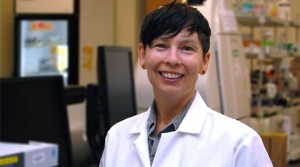When ACC’s Biotechnology Department expanded to the Round Rock Campus in 2010, faculty members couldn’t help but think “build it and they will come.”
Students did come, they just didn’t stay.
“We could tell we weren’t having a lot of retention,” says Biotechnology Chair Linnea Fletcher, Ph.D. “We weren’t entirely sure what the problems were, but we realized there were problems.”
The Biotechnology Department used the faculty coach program to illuminate some of the issues. Elected by their peers, faculty coaches are liaisons between their departments and ACC’s Office for Institutional Effectiveness and Accountability. They are trained to access and analyze data in the context of the five objectives outlined by the Student Success Initiative.
The department elected Associate Professor Shelley O’Grady to serve as faculty coach, examining departmental and institutional data to identify trends and opportunities for improvement. Her term concludes in 2014.
“We found out a lot of really interesting things from our review,” O’Grady says. “The faculty coach program has allowed us to focus our attention in a way that makes sense, instead of throwing out a bunch of nets.”
As the program enters its fourth year, many departments are turning sometimes surprising results into positive change.
“The Student Success Initiative has allowed the Biotechnology Program to make evidence-based decisions,” says Dr. Fletcher. “We were able to quickly determine why students were not being retained. We can see positive results already – after only one semester.”
Data revealed, for example, that only 25 percent of biotechnology students remained in the program until their final capstone internship course.
“The faculty coach program has allowed us to focus our attention in a way that makes sense, instead of throwing out a bunch of nets.”
In response, the department launched several initiatives to support students from the time they enter the program through graduation.
First, the department is promoting access by offering STEM (Science, Technology, Engineering, and Math) scholarship funds and work-study opportunities to qualifying students, an effort coordinated by Biology Professor Patricia Phelps, Ph.D.
Data also indicated that students were dropping out of prerequisite courses before they began with the introductory biotechnology course (BIOL 1414). The department explored options to allow students to enroll concurrently in the introductory course and prerequisite biology course. The department adopted a more engaging text for the introductory class, and added open lab times where students can obtain biotechnology-specific tutoring and hands-on lab skills practice.
In addition, incorporating more research activities into the curriculum will help students be more invested in their work.
“Undergraduate research has been shown to be one of the best ways to engage students in science,” Dr. Fletcher says. Along with Drs. Fletcher and Phelps, Adjunct Associate Professor Sulatha Dwarakanath, Ph.D., and Adjunct Professor Keqin Gregg, Ph.D., are working to involve students in projects both initiated by industry and embedded in coursework.
Meanwhile, a new student-run biotechnology club promotes a sense of community.
“We’re getting people to take pride in what they’re doing,” O’Grady adds.
On the other end of the spectrum, data indicated that students who completed the program weren’t applying to graduate. Biotechnology instructors now encourage students in the capstone course to submit the necessary forms and schedule class time to allow students to complete the task.
The department also hosts graduation celebrations and communicates graduation and job search information through alumni and current student Listservs and through Bio-Link, a national organization focusing on biotechnology education.
Without the faculty coach program, Dr. Fletcher and O’Grady agree, sifting through data likely would fall to the end of a department’s to-do list. Â The faculty coach program provides the time and resources needed to examine the underlying causes of issues. They advise other departments and faculty coaches to be open to unexpected conclusions.
“Try to leave assumptions at the door. Be open to what the data is going to show you, which may not be what you think,” O’Grady says.
Click here to learn more about the faculty coach program, or to view faculty coach reports submitted on behalf of several ACC departments.
Back to Top

